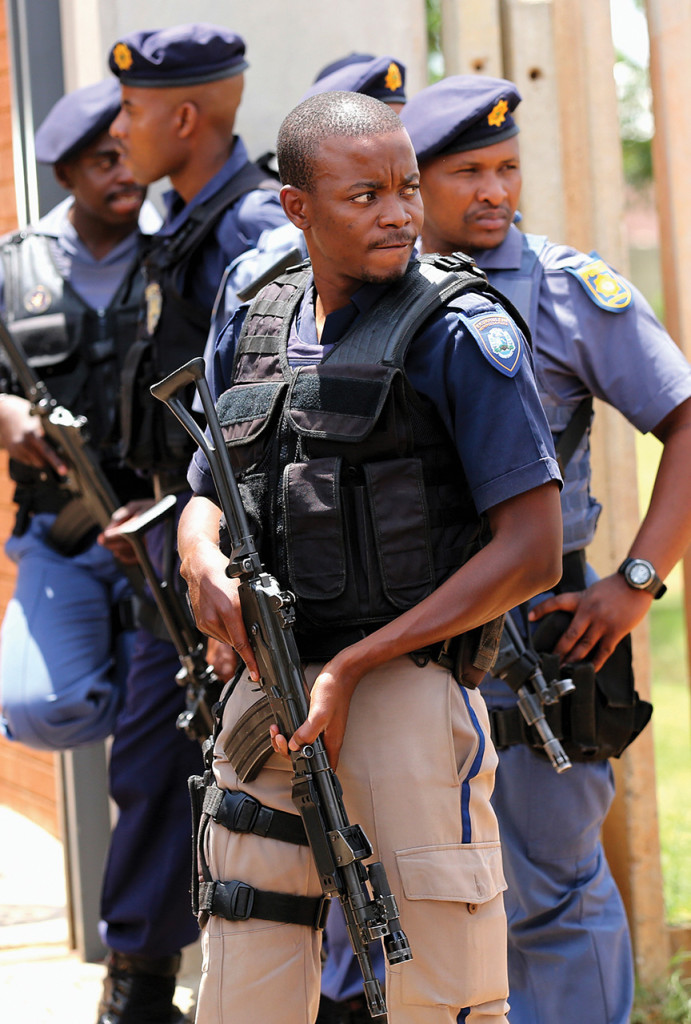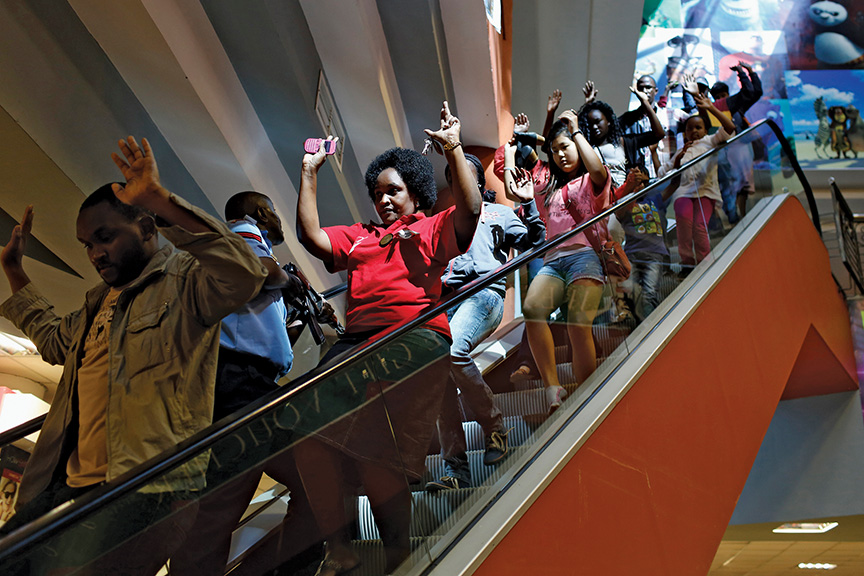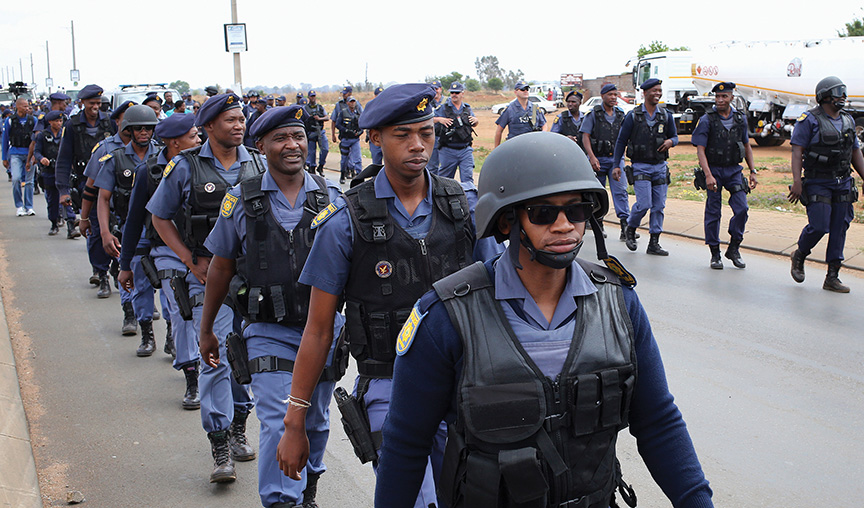Africa’s Police Are on the Front Lines of the Fight Against Extremism
ADF STAFF
Photos by Reuters
Fighting terror goes beyond military confrontations and high-profile missions like special forces raids to free hostages. The day-to-day work of dismantling terror networks is much more mundane. It involves traffic stops, passport verification, community outreach and intelligence gathering. Often police with deep knowledge of their communities are in the best position to accomplish the work. This is especially true in large, diverse metropolitan areas.
But not all police departments have embraced counterterror work or have been trained to do so. Research by security experts offers guidelines on how police can improve their ability to detect and disrupt extremists and dismantle terror networks.

Preliminary Crimes
Terror organizations tend to leave a trail of their activities. Experts say that in the months leading up to an attack, there are often a large number of “preliminary crimes” associated with the group. The key to identifying this trail is educating police about the warning signs, said Dr. Paul Howard, a senior fellow at the Manhattan Institute who studies crime trends. This means police must keep terror in the forefront of their minds every time they stop a vehicle, examine identification or arrest a suspect for a petty crime.
“Terrorists do not operate in a logistical vacuum,” Howard wrote. “They do not typically enter their host countries with access to large amounts of hard currency and therefore must engage in a wide range of illegal activities to finance and prepare for their operations.”
Howard said preliminary crimes associated with terror tend to include:
- Credit-card fraud
- Counterfeiting
- Identity theft
- Narcotics trafficking
- Smuggling
- Money laundering
These crimes warn of something much larger. Howard compared an emphasis on preliminary crimes to a reform in New York City where police began arresting people who jumped subway turnstiles to avoid fares. The crackdown led to an overall drop in subway crime, and police discovered that many of those arrested had outstanding warrants, possessed drugs or had illegal firearms.
“Terrorism’s equivalent to fare jumping in the New York City subways are illegal border crossings, forged documents, and other relatively minor crimes that terrorists use to fund their operations,” Howard wrote.
CNI
An essential part of any police counterterror effort is identifying likely attack targets. These sites are usually called critical national infrastructure (CNI) and are prized by terrorists because they have the most wide-ranging economic impact, and attacks against them can affect a nation’s psyche. CNI tends to be in the following sectors:
- Communications
- Government
- Emergency services
- Transportation
- Energy/water
- Finance
In addition to these sectors, it is important for police to consider symbolically important targets, including places of worship, national monuments and economic centers such as malls, banks or stock exchanges. Once these sites have been identified, police should allocate extra resources to protect them and work with leaders at the sites to ensure safety.

Police “must create ongoing working relationships with these sites through ‘trusted partners’ within the organization with whom they will share intelligence, develop contingency plans, and coordinate operations in the event of an emergency,” Howard wrote.
This partnership will be a balancing act. In most countries, the critical infrastructure is largely privately owned; a study of the U.S. found that 85 percent of CNI is in private hands. Yet, many private owners do not have the resources to protect the infrastructure from a large-scale attack.
Police can help bridge this capabilities gap by offering advice and training on a variety of protection measures, including access control to facilities, evacuation plans, emergency communications systems and employee background checks. Police also can partner with business owners to perform a risk assessment of their facilities to identify weaknesses.
Community Policing
For police to stay one step ahead of terror groups, they must also embrace new types of police work. Community policing requires officers to engage with people in nontraditional ways, both to keep abreast of local developments and to win over allies who are in the best position to alert them of unusual activity.
These types of police activities require officers to serve as one part investigator and one part social worker, according to Dr. Basia Spalek of the University of Birmingham in the United Kingdom. Unlike undercover work, community policing is not a matter of infiltrating extremist groups or cultivating informants, although this work may be necessary in some cases. Instead, it involves giving special attention to ethnic minority, expatriate and religious minority communities in cities where terror groups tend to recruit. Police can build bonds by visiting places of worship and homes, attending wedding ceremonies and funerals, and listening to concerns from people in these communities. Police must also show active interest in pursuing cases that specifically affect these community members, such as hate crimes.

Through this work, citizens will view police as allies and be more likely to tip them off to suspicious activity. One innovative policing unit of this type is the Muslim Contact Unit (MCU), created in the United Kingdom in the early 2000s. This unit has won support from community leaders in London’s sizable and diverse Muslim community. The MCU has tallied a number of high-profile accomplishments, including facilitating the change of leadership at the Finsbury Park mosque in London, which had become a haven for extremists.
“The MCU has succeeded in reclaiming a mosque from hard-core violent extremist supporters,” Spalek wrote. It “helped to put together community-based initiatives aimed at preventing violent extremism in London; provided support to minority sections of the Muslim population who have experienced stigmatization in relation to them being categorized as ‘suspect communities’; enhanced trust in policing with sections of the Muslim population by supporting victims of racist and Islamophobic attacks; and has introduced Muslim police officers into counter-terrorism policing.”
The connection between police and civilians is vitally important in many African countries, where corruption has led to the police being held in low esteem by much of the population. In Kenya, for instance, a report by Transparency International found that police have the worst reputation of any institution surveyed. This lack of respect makes citizens unwilling to cooperate.
“Due to the tainted record, the number of ordinary people who fear police officers is still high,” said Abubakar Barusi, a Kenyan human-rights advocate. “People who are at the community level believe it’s like betraying oneself to [tip off] the police about crime.”
To combat this perception, Kenya has launched a national Community Policing Project that seeks to encourage cooperation and trust between citizens and police. Likewise, in 2013, the police chiefs of the East African Community agreed to set up regional centers of excellence, including a center in Uganda dedicated to community policing.
Intelligence Sharing
Although policing terror may start at the local level, it cannot end there. According to Martin Ewi, an expert on international threats and transnational crime with the Pretoria-based Institute for Security Studies, African nations must do a better job of sharing intelligence. Ewi found that although political and economic integration have progressed in recent years, this has not occurred with intelligence sharing.
“The main obstacles to practical cooperation have been state sovereignty and the view that practical counter-terrorism cooperation, particularly at the police-to-police level, impinges on state privacy,” Ewi wrote. “This is even more pronounced with regard to cooperation between police and other law enforcement agencies such as gendarmerie, intelligence agencies, the army, customs, and port/border authorities. The relationship is often characterized by competition and mistrust.”
This lack of intelligence sharing can have catastrophic effects. There have been instances where internationally wanted terror suspects have been arrested and released by authorities who were unaware of a suspect’s importance simply because intelligence was not shared by another nation or domestic agency.
Ewi recommends a greater role for Interpol to share intelligence about extremism, drugs and other cross-border crimes. “Through Interpol, police around the world can access criminal databases, investigative tools, targeted training and secure communication lines, among other crime-fighting tools that most West African countries cannot afford,” Ewi wrote. “For example, Interpol has a high-tech 24-hours-a-day seven-days-a-week global communication system (I-24/7) that enables police in different countries to communicate with one another, share critical information, facilitate mutual legal assistance, and undertake joint operations.”
There are burgeoning regional initiatives to accomplish this. The West African Police Information System was developed by Interpol in 2010 and works to centralize and share information from law enforcement agencies in participating West African nations. The East Africa Police Chiefs Cooperation Organization does much of the same work for East African nations, including holding training events and sharing information related to terror groups.
In the wake of the terror attacks by al-Shabaab-linked gunmen in the Westgate Shopping Mall in Nairobi, some security experts are calling for greater cooperation, particularly between Somalia and Kenya.
“Kenya’s National Intelligence Service and Somalia’s National Intelligence and Security Agency should pool their resources to develop a comprehensive regional terrorism databank and come up with a forum for agents to regularly meet and compare intelligence data and analysis,” Sabahi Online reported in October 2013.
“Such a databank would have names of suspected terrorists, their updated pictures, location and recent movement, associates and their communication logs and source of funding,” Somali Ambassador to Kenya Mohammed Ali Nur told Sabahi Online.
Lack of information flow is not just a problem between nations. Intelligence should be shared among law enforcement agencies within a nation. After the attacks of September 11, 2001, in the United States, a national commission determined that better information-sharing between government agencies and between the federal government and local law enforcement offices could have prevented the attacks.
Most notably, three of the 9/11 hijackers were stopped separately for traffic violations not long before the attacks. All three had overstayed their allotted time on their immigration documents, one had an outstanding warrant in another state, and at least one of the men was on a CIA watch list. However, because local police did not have access to this information, each man was allowed to go free.
In 2010 congressional hearings on the issue, numerous observers pointed to the importance of information-sharing that involves local police on the beat.
“The diffuse nature of today’s terrorism threat and the emphasis on do-it-yourself terrorism challenge the presumption that knowledge of terrorism plots will come first to federal authorities who will then share this information with state and local authorities,” said Brian Michael Jenkins, a terrorism expert. “It is just as likely –– perhaps more likely –– that local law enforcement could be the first to pick up clues of future conspiracies.”
To rectify the shortfalls, the U.S. has instituted the Nationwide Suspicious Activity Reporting Initiative in which police on the beat are encouraged to share encounters or information that could be terrorism-related. Through a nationwide network, this information is vetted and disseminated to local and federal agents across the country.
Lessons Learned from Westgate
ADF STAFF
On September 21, 2013, a group of al-Shabaab-linked terrorists stormed the Westgate Shopping Mall in Nairobi and, using assault rifles and grenades, conducted a four-day siege that left 67 people dead. The incident was a national tragedy, one of the deadliest terror attacks against a civilian target in recent African history. It was also cause for self-reflection on the part of Kenya’s military and law enforcement, which asked what could have been done to prevent the attack or save lives once it began. Below are some “lessons learned” from multiple sources:
Have an emergency evacuation plan: In the first moments of the attack, there was an understandable panic in the mall. Based on closed-circuit footage, store employees and shoppers appeared to have been unaware of how to find the six emergency staircase exits in the 33,000-square-meter mall. Store security personnel also did not use the mall’s public address system to give instructions to frightened shoppers. An emergency plan constructed and practiced ahead of time in coordination with the Kenyan police could have led to a smoother evacuation.
Clear identification of first responders: Many of the first responders from the Kenyan Police and other groups wore plain clothes. This lack of identification made it easy for them to be mistaken for the attackers. Confusion as to who was a “friend or foe” led to shooting injuries. There also was a reported lack of communication and coordination between the Kenyan police and military responders.
Outer perimeter control: The first security professionals on the scene did not adequately establish a secure perimeter around the mall to block people from entering or leaving.
Prioritizing Westgate as a possible target: There were reportedly conversations among the National Intelligence Service, the inspector general of police and the criminal investigations department about the risk of an attack on Westgate. If the mall had been prioritized as a possible target, a risk assessment and emergency plan could have been put in place.
Community policing in Eastleigh: It appears the attackers spent four months in Nairobi preparing for the attack. They made numerous purchases including a vehicle and SIM cards for mobile phones. They also were often visible at a local gym. Community policing in Nairobi’s predominantly Somali neighborhood of Eastleigh might have yielded clues about the young men’s activities before the attack.
Border enforcement: The Star newspaper of Nairobi reported that the men trained in Somalia, flew to Uganda and crossed into Kenya on foot before making their way to Nairobi. It is unclear whether they were ever stopped and asked for identification, but police at roadblocks have been known to allow people to pass through without identification in exchange for a bribe. This practice negates national efforts to secure the border.
Sources: KenyaCitizenTV, Jillo Kadida of The Star, Agence France-Presse,
New York City Police Department


Comments are closed.